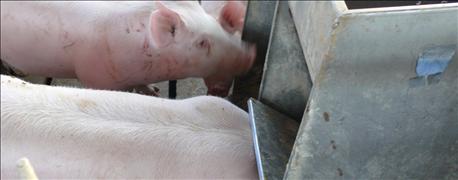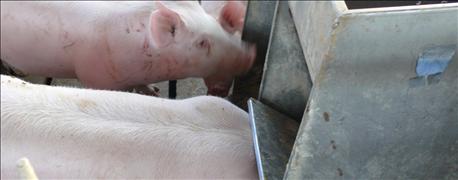December 2, 2016

Natalie Baker, a practicing veterinarian from Boonville, is expecting an extra item on her daily to-do list. In January, Baker will start prescribing antibiotics to her producers who need an antibiotic in the feed for their livestock herd.

MAJOR CHANGE: As of Jan. 1, swine feed or any other animal feed can no longer contain antibiotics deemed important to human health unless it is prescribed by a veterinarian.
Veterinary feed directives will go into place on Jan. 1. As of that date, all producers will have to work alongside a veterinarian to medicate their commercial livestock feed with antibiotics categorized as important to human medicine. Once the changes are implemented, it will be illegal to use medically important antibiotics for production purposes, and animal producers will need to obtain authorization from licensed veterinarians to use those drugs in feed or water for prevention, control or treatment of specifically identified diseases.
What does "medically important" mean? These antibiotics are based on their importance to human health. Antibiotics that aren’t considered important include bacitracin, Mecadox, tiamulin (Denegard), narasin and bambermycin. Excede, Draxxin, lincomycin, penicillin and the tetracyclines are examples of drugs considered critically or highly important to human health.
Timing factor
Why does the government want to change the rules now regarding antibiotic use in food animals? There is rising concern about bacterial resistance to antibiotics. The veterinary feed directive is the result of government agencies looking into antibiotic use in human and animal medicine. The focus is to see if there is an antibiotic resistance from livestock to human consumption.
The antibiotic resistance still has an impact for antibiotic use in livestock. This law will assure the public that antibiotics are being used properly and responsibly by farmers, and it will ensure that antibiotics do not pose any risk to human health.
What to expect
How do these changes affect livestock producers? There are two major changes. Companies that produce feed medications will no longer sell those medications that are labeled only for growth promotion. All medically important antibiotics that are fed for growth promotion will go away.
The second thing farmers need to prepare for is antibiotics used for prevention, control or treatment of disease in feed or water considered important to human health. Those antibiotics will need to be prescribed by a veterinarian, or the VFD will be required.
Some farm stores that previously sold medicated feeds, such as Tractor Supply Co., have alerted customers through their websites that certain products will no longer be available. A longtime veterinarian, however, confirms that certain antibiotics for injectable use will still be available at many farm stores.
If your farm doesn’t have a regular veterinary checkup or herd health adviser, contact a veterinarian and have him or her check your herd. It will be crucial to inform the vet of all common diseases your herd has faced in the past. Also, help the vet understand your herd flow.
You need to build and establish a veterinarian-client-patient relationship. When your animals get sick and you need a prescription or VFD, you’ll need the VCPR to obtain them. If you already have a good relationship with a veterinarian, you’re on track for the Jan. 1 changes.
Stevens is a senior in ag communication at Purdue University.
You May Also Like




